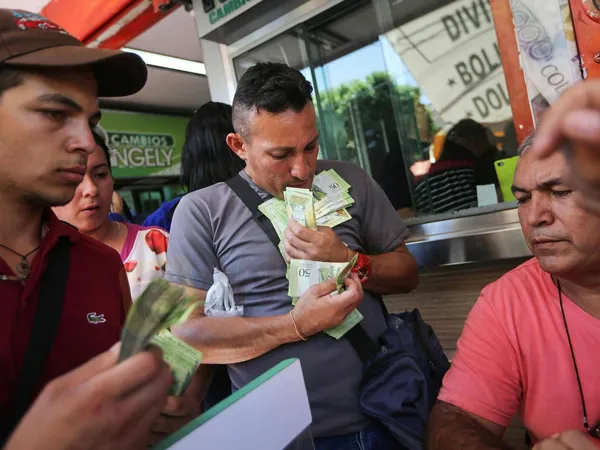简体中文
繁體中文
English
Pусский
日本語
ภาษาไทย
Tiếng Việt
Bahasa Indonesia
Español
हिन्दी
Filippiiniläinen
Français
Deutsch
Português
Türkçe
한국어
العربية
Venezuela's inflation hit 686.4% in 2021 - central bank
Abstract:Venezuela's annual inflation rate hit 686.4% in 2021, demonstrating a deceleration of consumer price growth versus the previous year when inflation was 2,959.8%, the country's central bank said on Saturday.

Venezuela's annual inflation rate hit 686.4% in 2021, demonstrating a deceleration of consumer price growth versus the previous year when inflation was 2,959.8%, the country's central bank said on Saturday.
Monthly inflation in December rose 7.6% and, since September, the inflation rate has remained in the single digits.
The deceleration in prices follows government measures which include the restriction of credit and lower spending in bolivars to maintain the stability of the exchange rate.
As a result of this strategy, government entities and state-owned oil company PDVSA now pay suppliers in cash with foreign currency.
During an interview broadcast on state television at the start of this month, Venezuela's President Nicolas Maduro said hyperinflation - which ran for four years - had been left behind.
Despite measures to improve supplies and control inflation, prices remain high and continue to hit the earnings of Venezuelan families, limiting their ability to buy goods like food and medicine. A minimum monthly salary is equivalent to $1.50.
In 2019, amid hyperinflation and economic collapse, Venezuela's government relaxed economic controls, allowing greater quantities of foreign currency to circulate, which provided some sectors with breathing space.
The central bank has yet to publish data regarding the country's economic growth.
For more Forex news, please download WikiFX- the Global Forex Regulatory Inquiry APP.
Disclaimer:
The views in this article only represent the author's personal views, and do not constitute investment advice on this platform. This platform does not guarantee the accuracy, completeness and timeliness of the information in the article, and will not be liable for any loss caused by the use of or reliance on the information in the article.
Read more

Soft Inflation, Firm Yields: Fed Rate Cut Delayed to Year-End
The U.S. bond market initially rallied on cooling inflation but lost steam as Wall Street bet on later rate cuts. Fed policy expectations now lean toward a December easing, dampening gold and boosting equities.

When Tariffs Trigger Turmoil: 10 Past Trade Wars That Rearranged the World
Far from being mere policy tools, tariffs and trade restrictions have repeatedly served as catalysts for economic upheaval, diplomatic rifts, and even armed conflict. Here are ten historically significant trade wars that altered the course of nations and the global economy.

Are We in a Retracement Or the Start of a Financial Collapse?
As markets fluctuation in uncertain times and headlines grow darker, investors are left asking a crucial question: Is this a temporary downturn or something far worse? The terms bear market, recession, and depression are often thrown around interchangeably, but they represent very different levels of economic pain. Read this article to understand the differences between all three.

Why Fed Keeps Interest Rates Unchanged, How Does It Affect To Forex Market?
Fed keeps interest rates at 4.25%–4.50%, impacting forex market. Dollar may rise as tariffs loom. Explore why rates unchanged and forex effects.
WikiFX Broker
Latest News
SkyLine Guide 2025 Malaysia: 100 Esteemed Judges Successfully Assembled
Vantage Markets Review 2025: Trusted Forex and CFD Trading Since 2009
TradingPRO: A Closer Look at Its Licences
The world could be facing another ‘China shock,’ but it comes with a silver-lining
A Guide to Intraday Forex Trading You Can't Miss Out
CONSOB Blocks Access to 13 Unauthorized Investment Websites
Why STARTRADER Is Popular Among Traders?
New SEBI Regulations on Intraday Trading
Everything You need to know about Barath Trade
OctaFX Flagged by Malaysian Authorities
Currency Calculator


